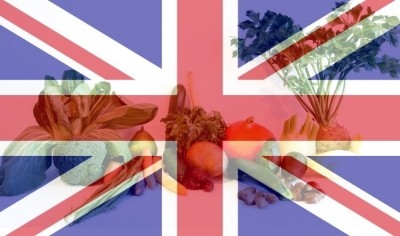Food business leaders: 2020 lessons and what's next?

One of the most heartening things to emerge from the past ten months is that despite the tight deadlines that so much of the food and drink supply chain work to, processors as a whole rose to the challenge. They got food to customers either via traditional routes or through direct online ordering from consumers.
And the signs are, with Christmas just around the corner, the sector will continue to deliver despite being under severe pressure. However, if the industry is to remain resilient into 2021, it must still, regardless of immediate pressures, keep its eyes scanning the horizon to remain prepared. To this end, we asked key leaders to look forward as well as back to offer the industry some insight for the future.
STEFANO AGOSTINI, CHIEF EXECUTIVE, NESTLE UK & IRELANDVery early in the crisis, the world realised what we already know: people working in our sector are key workers and the role we play in society is crucial. Throughout this period, it has been vital that we continue producing, manufacturing and distributing the highest quality food and drink in the safest possible way.
We worked closely with our trade union partners to put in place the right measures to keep our people safe from the very beginning of lockdown.
Our factories already had strict hygiene measures in place, and we issued extra guidance and implemented additional stringent control measures, such as two metre physical distancing, more frequent handwashing and sanitising and the usage of surgical masks across all our sites.
We are proud that we have been able to continue our manufacturing and distribution throughout the period and, in many cases, have stepped up production to meet an unpredictable demand.
We are not complacent. As positive cases rise around the UK and Ireland, we will be more vigilant than ever and uncompromising in our approach to people’s health and wellbeing.
The parts of our business that work in hospitality and out-of-home have been hit hardest by the shutdown caused by the pandemic. We have put in place a number of initiatives to support our customers in this area, including free products to businesses, extended credit terms and rental pauses for those customers most at risk.
Adapting to trends
What is clear is that we will need to be faster, more responsive and more agile in how we supply our products in all conditions. The new digital distribution warehouse we are opening in the East Midlands gives Nestlé UKI the flexibility to do this, as well as to provide a bespoke, personalised service to our customers.
Demand for online shopping has obviously increased. There have been more new online shoppers in 2020 than in the previous five years and those who are over 65 years of age are spending nearly double on online deliveries than they were a year ago.
To help meet some of that demand we partnered with Deliveroo for the first time to make some of our favourite confectionery, coffee and waters products available direct to the home. We have also introduced a brand new webshop for Quality Street this year, which offers shoppers the chance to pick and mix their favourites and personalise their tins without needing to physically visit a store.
Nespresso has seen its direct-to-consumer business grow considerably since the outbreak of COVID-19, with many people working from home and looking to recreate a barista-style experience in their own kitchens.
Post-pandemic
Just as food and drink has been vital to the crisis response, it will be fundamental to the recovery.
DEFRA [The Department for Environment Food and Rural Affairs] will publish the National Food Strategy in 2021 which will, alongside the challenges we are facing now, provide a unique opportunity for industry and government to come together and shape the future.
I am working with colleagues across the supply chain, as part of the Food and Drink Sector Council, to make sure that the government’s view of the future UK food system is informed by those who know it best.
Nestlé is taking this chance to look at how we can do things differently, using what we’ve learned this year to create an even more flexible and diverse workplace for our people.
Then, beyond the walls of our offices, factories, stores and warehouses there are urgent societal concerns that demand our attention. Those at the start of their careers are seeing their opportunities limited by the impact of COVID-19.
This is the time to back young people and to remember what they bring to our businesses: a mix of energy, fresh thinking and new skills.
Despite the pandemic, we have prioritised the on boarding of apprentices, graduates and interns into our Nestlé Academy and we are now increasing the number of placements into 2021.
Green recovery, child poverty
Similarly, we cannot forget our considerable obligations to the planet. I genuinely believe that food and drink can be part of a truly green recovery and our collective efforts in areas like packaging, climate change and the responsible sourcing of ingredients will be more important than ever.
Finally, Marcus Rashford’s taskforce to end child poverty has put the spotlight on an issue that really should not exist in 2020.
We are proud to be a part of that effort and have been working with partners including Community Shop, Fareshare and Food Cloud to invest in improving access to food for vulnerable people across the UK and Ireland. It is not OK for people to go hungry and ours is the industry best placed to make a difference.
We can be very proud of our actions and achievements through what has been an unquestionably tough period. There is now a real chance to put food and drink at the heart of the recovery so we should take it.
Plant-based trends
The food system is changing. It always has, but now it needs to change to reduce waste and optimise the use of plant proteins.
At Nestlé, we are adding more plant-based products to our portfolio in response to increased demand. It’s part of our efforts to offer tastier and healthier choices for consumers.
For those of us in the food industry, the challenge is simple. We need to make meals based upon plant protein as ubiquitous and as easy to prepare as meat dishes. A consequence of that will be healthier populations, better animal welfare and lower impact upon the planet.
Globally, Nestlé has around 300 research & development scientists, engineers and product developers located in eight centres that are dedicated to the research and development of plant-based products. To complement its internal capabilities, the company also strategically collaborates with researchers, suppliers, start-ups and various other innovation partners.
GWYN HOWELLS, CHIEF EXECUTIVE, HCC, MEAT PROMOTION WALESOur industry has had to be very adaptable during 2020. We’ve had to be fleet-footed and redirect marketing into campaigns to boost retail purchases of cuts that were formerly in demand from foodservice, with very positive results.
The year has been very tough for the hospitality industry and its suppliers, though some companies have coped by doing business in new ways such as takeaways and click-and-collect. Many independent butchers, in particular, have seen huge increases in the retail side of their business and have served their communities admirably.
“Exports have been less severely hit than was initially feared. There was disruption in the spring, but Welsh Lamb exports to many countries – especially markets where there’s a large retail trade like Italy – have by now caught up with 2019. Growth in new markets we have targeted for investment, particularly the Middle East, has also continued almost unabated.
“From our in-depth interaction with meat exporters in Wales, it’s clear that their major concern is the threat of a ‘no-deal’ scenario.
"While there are other uncertainties regarding 2021 such as the ongoing impact of COVID, for the lamb sector in particular they are dwarfed by the threat of WTO [World Trade Organisation] tariffs to our largest markets from January 1.”
DAVID JONES, CO-FOUNDER WITH JONNY BINGHAM OF BINGHAM & JONESWe have remained very busy and buoyant during the pandemic.
Our central message at the start of the first lockdown was for companies to carry on innovating as there will have to be a moment when things return to normal and when it does, the retail buyers and developers will have to resume their jobs. Companies who have not innovated will get hammered by the retailers at that point and then it will be a reactive knee jerk rather than a pro-active pipeline.
The very hard thing for brands and suppliers who want to launch new products has been that they can't get in to the retailers to showcase their products. They have been in the hands and limited culinary abilities of the buyers and developers to prepare products that are being sent in and products are not being shown in their best light.
This is something we have experienced on several occasions and serious opportunities have been lost for both the retailer and supplier.
How a vaccine will change things
It seems as though we are weeks away from a vaccine. That will be a gamechanger! NHS staff and the vulnerable will clearly get the treatment first, but as soon as it rolls out, it will be business as usual. Companies who are sitting back and watching what happens will be left behind.
For us and many we know, we have all learned to work better from home, to not travel to meetings unless we are presenting a physical product and to generally think a little more about how we use work spaces.
We know very large businesses who had turned their offices into hot desks thinking it was going to be the office of the future. The reality is, it couldn't be more in the past.
Brexit
Brexit so far has not affected Bingham & Jones directly. The truth is it is still an unknown for us. We must all carry on as if they will find some deal at the eleventh hour.
There have already been changes that would allow the Government to bypass the opinion of the public and the House of Lords to allow them to remove the legislation that the EU provided over food safety, food quality and the protections of certain foods. This makes it likely that the government will begin to allow US standards on imports, lowering our food quality and safety.
There will be an unwinnable fight for a while because those imports will be at a price point that can't be matched under the EU standards at a time when income is at an all-time low.
The big food companies will go into that process slowly and see how consumers react to those first imports. This could be a catalyst to slow down NPD and rather than to innovate the priority is to match the previous product as closely as possible using the cheaper and poorer quality supply.
We are the fifth richest economy in the world and we buy an incredible amount from the EU as well as sell a great deal. Beyond that, the financial institutions that are based in the City are intrinsically linked to the finances of the EU. Pragmatism would surely dictate that a route should be found.
Reestablishing foodservice
The challenge will come from reestablishing the foodservice sector and the money that has been lost therein. The most beneficial thing that the Government has done for foodservice has been to reduce the VAT from 20% down to 5% and is something that, as a past restaurateur and chef, I argued for to mirror the French model.
The French always seemed to realise that culturally restaurants are an important part of the national fabric and that it is important to ensure the longevity of the industry. Restaurants and cafes are businesses that have been family owned for generations in some cases, but I can't ever see that being the case in this country, unless real intervention into the amount of tax paid is looked at sensibly.
NPD trends
We are clearly seeing the rise of the home chef. Being constrained by the walls of your own house has created a new generation of home bakers and cooks, where the likes of Instagram have blown up with great sourdoughs, great ferments, great meals prepared by those who would have ordinarily bought more convenience meals and would not have had the time to experiment in their own kitchens.
Health has also been an obvious winner over the year and will be very strong in the year ahead. However, sustainability is quickly catching up health as the key driver especially in the plant-based sector.
A great deal of what we are developing for our clients has an element of added benefit, whether that's vitamin, mineral, probiotic or antioxidant additions. The appetite for those products seems to be insatiable.
The inevitable backlash from preparing and eating foods from home, without the movement of exercise to contrast the lifestyle will make people think about how and what they eat a little more, so we are predicting the start of micro-meals. This would be small tapas-sized plates eaten as snacks rather than main plate meals within the home. We could see this filtering into convenience too. 'Little and often' meals would start to proliferate.
In terms of the plant-based movement, we thought lockdown would have slowed it down and everyone would be back on the bacon within ten minutes. But the resolve of plant-based lifestylers has been even stronger and the movement only looks to be gaining momentum.
Fixtures are definitely going to change. Burgers, sausages and the like will get thinned down and we will see SKU [stock keeping unit] reductions within those areas, but more innovative products will start to emerge. In terms of plant-based, we are seeing clear gaps that are not being taken up by the retailers and suspect this may change when the dust settles and we see the SKU cull.
RICHARD CLOTHIER, MANAGING DIRECTOR, WYKE FARMS
We have learnt the importance of having an engaged and motivated workforce. Our team have been fantastic over the year in reacting to the increased demand that lockdown has stimulated.
Focusing on the positives, we have reduced our scope 2 [greenhouse gas] emissions massively over the year. We have proved that it is possible to run our business without all driving to see people or driving to meet up face to face once or twice per week.
[Microsoft] Teams has been a revelation for us, we now communicate better than ever and without people driving thousands of miles per year, their risk of accident is less and they can spend more time with family. Post-COVID we need to retain some of these good things and not return to old ways.
Central office will no longer be a place that everyone has to attend at a certain time everyday and leave at a certain time congesting the roads and gassing the towns as we do so. It needs to become the hub of communication that aids home working and galvanises the team around the common objectives.
Audits
Despite having the highest level of BRC accreditation in our factories, we would normally be audited again by customers day after day. It’s been a relief that some of them have halted this and relied on BRC, as this saves cost and time for everyone. Let’s hope that this risk based approach can stay.
The business over the past year has been focusing on automation and upskilling jobs. We have achieved this in most areas. In these areas we were able to social distance much more effectively and maintain high production levels.
We have also learnt the benefits of having a diverse customer base not just in food service verses retail, but a geographically diverse base also.
Lessons for the food chain
Anything weak, stressed or at its limit was instantly exposed by COVID. I think the industry has learned that lean manufacture and ‘just in time’ management leave the sector vulnerable to shortages in the event of problems.
Who would have imagined last year that our country could be shut down due to a viral infection and that people would only be allowed out to buy food?! It has taught us that these outlandish scenarios that we sometimes model do actually happen and when they do, we come as close to we have ever come to food shortages and civil unrest that I have seen in my lifetime.
World climate change or some kind of climate event remains the biggest risk to the food industry and with world populations rising to 9bn, the risk is event greater.
We must build more robust food supply chains with more resilience. Our food systems need to be more climate-robust and we have to do everything possible to address climate change.
Our predecessors appreciated this more than we do, which was why after the war they encouraged production and a scheme of storage of essential commodities called ‘intervention’ that ensured we would never run out of butter, milk powder and cheese.
Things will return to ‘normal' and foodservice will see a strong bounce as people look to go out more again. I hope we will learn the lessons from COVID and develop more robust supply chains. The recent CO2 crisis showed us the dangers of having overly-consolidated supply routes. When we risk assess our lists of essential items, CO2 was an issue, but it could easily have been caustic cleaning chemicals, other essential gases or packaging.
I hope that the ‘simpler’ way of working will stay as it can lower costs and improve the environment.
Brexit
Initially, Brexit has the potential to be very disruptive. We still don’t know what we need to be putting on EU packaging for example for 1 January 2021. I hope that goodwill with the EU can be retained. It would be very damaging to see a return to the tit-for-tat trade issues that we saw in the 1970s, where French farmers would hold up lorries.
Tariffs will be problematic, but the real issue could be the effect on currency. A good deal could see sterling firm and a poor deal could see weakness. It’s very hard for anyone either side of the water to hedge currency when no one knows what the effect on sales volumes will be. Business can prepare for anything, just tell us what we are preparing for!
On a positive note, if we can agree our own trade deals outside of the EU, that will be a massive advantage as most growth, population and affluence will be outside of the EU in Asia, South America and Africa. If the government adopts an export mindset and gets behind the mission then the UK food industry has potentially the biggest opportunity for 50 years.
Climate change the next challenge
The next challenge will be climate ‘events’ or ‘event’ playing out against a backdrop of rising world populations leading to food shortages.
We have to develop more climate robust food systems and we have to learn from our post-war colleagues and start to address the fragility of the supply chain.
A drought like we saw in 1976 would be devastating now, as we don’t have adequate food storage in place like we did then and we produce less of our food at home. Brexit is a chance to reform farm payments to encourage farmers try to produce a bigger percentage of the food that we eat here in the UK.
As an industry we have to focus on the great things about the UK dairy industry, the positive nutritional benefits, the fact that we have some of the best farmers in the world and dairy products are produced here to the highest standard and to the highest level of animal welfare.
We must also be self-critical and strengthen our environmental credentials. We have to embrace the technologies available to lower farm carbon footprints and research ways of producing milk in a way that has a net positive impact on the environment. In that respect, the challenge for all food producers is the same: feed 9 billion people without buggering up the environment.
















